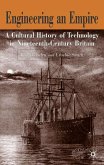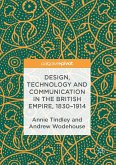Engineers are empire-builders. Watt, Brunel, and others worked to build and expand personal and business empires of material technology and in so doing these engineers also became active agents of political and economic empire. This book provides a fascinating exploration of the cultural construction of the large-scale technologies of empire.
'In a work that combines broad synthetic sweep with a sharp eye for the telling detail, Ben Marsden and Crosbie Smith show us not only how steamships, railways, and telegraphs shaped Britain and its growing Empire, but also how those and other technologies were themselves shaped by the industrial and imperial context of their times. It is an important story, and Marsden and Smith tell it in an incisive and deeply informed way.' - Professor Bruce J. Hunt, University of Texas at Austin, USA
'Smith and Marsden provide here a brilliant and concise analysis of the figure of the Nineteenth-Century British engineer and the social and technical significance of engineering's work...The book will be indispensable for historians, technologists and anyone interesed in the roots of the current relation between applied knowledge and the wider society.' - Professor Simon Schaffer, University of Cambridge, UK
'At last! This is the history of British technology we have been waiting for. When we open up the steam machines we find not just the cogs and wheels, but people of all sorts, stories that surprise, and all working in a cultural context of the highest sophistication. Marsden and Smith's cultural history matchs the best in new nineteenth century scholarship.' - Dr Jon Agar, author of Turing and the Universal Machine: The Making of the Modern Computer
'Matthew Boulton famously jested that he sold what all the world desired - power. Engineering Empires purveys the same double meaning. While it focuses on technologies of power in industry, transport, and communications it explores the social and cultural mechanisms through which engineers and scientists built up their personal and business empires at the same time as they facilitated the global expansion and hold of British imperialism. In particular, it is sensitive to the means by which trust was established, confidence maintained, and reputations won or lost; how demonstrable failures, such as the breaking of submarine telegraph cables, could be re-interpreted as harbingers of ultimate success' - Christine Macleod, University of Bristol, in the Economic History Review
'A stimulating and richly articulated view ...Historians of science and technology now have at their disposal a historiographically sophisticated overview of the subject that links coherently and convincingly to contemporaneous developments of imperialism, physics, mass-transit, popular culture, Victorian enterprise, and parallel developments in the USA. Readers will be indebted to the co-authors for successfully framing these issues within a broad conspectus of Georgian and Victorian cultures, and doing so in a concise and freshly researched single volume.' - Graeme Gooday, University of Leeds, in Annals of Science
'an excellent work highly recommended as a textbook for introductory courses on the history of nineteenth-centruy technology and Victorian imperialism.' - The HistoricalJournal
'Smith and Marsden provide here a brilliant and concise analysis of the figure of the Nineteenth-Century British engineer and the social and technical significance of engineering's work...The book will be indispensable for historians, technologists and anyone interesed in the roots of the current relation between applied knowledge and the wider society.' - Professor Simon Schaffer, University of Cambridge, UK
'At last! This is the history of British technology we have been waiting for. When we open up the steam machines we find not just the cogs and wheels, but people of all sorts, stories that surprise, and all working in a cultural context of the highest sophistication. Marsden and Smith's cultural history matchs the best in new nineteenth century scholarship.' - Dr Jon Agar, author of Turing and the Universal Machine: The Making of the Modern Computer
'Matthew Boulton famously jested that he sold what all the world desired - power. Engineering Empires purveys the same double meaning. While it focuses on technologies of power in industry, transport, and communications it explores the social and cultural mechanisms through which engineers and scientists built up their personal and business empires at the same time as they facilitated the global expansion and hold of British imperialism. In particular, it is sensitive to the means by which trust was established, confidence maintained, and reputations won or lost; how demonstrable failures, such as the breaking of submarine telegraph cables, could be re-interpreted as harbingers of ultimate success' - Christine Macleod, University of Bristol, in the Economic History Review
'A stimulating and richly articulated view ...Historians of science and technology now have at their disposal a historiographically sophisticated overview of the subject that links coherently and convincingly to contemporaneous developments of imperialism, physics, mass-transit, popular culture, Victorian enterprise, and parallel developments in the USA. Readers will be indebted to the co-authors for successfully framing these issues within a broad conspectus of Georgian and Victorian cultures, and doing so in a concise and freshly researched single volume.' - Graeme Gooday, University of Leeds, in Annals of Science
'an excellent work highly recommended as a textbook for introductory courses on the history of nineteenth-centruy technology and Victorian imperialism.' - The HistoricalJournal








